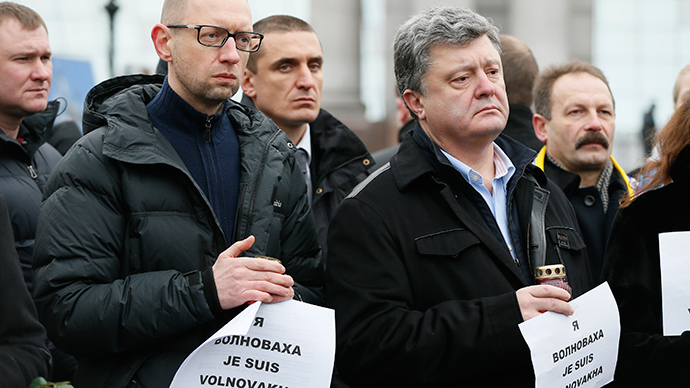'Je suis Volnovakha': Charlie-copycat slogan at pro-govt rally as Kiev shells E. Ukraine

Top Ukrainian officials were holding “Je Suis Volnovakha” banners at a rally in Kiev meant to commemorate the victims of a tragic bus incident that killed 13. It comes as Kiev ordered massive shelling in eastern Ukraine on Sunday.
The government in Kiev is apparently trying to capitalize on the massive public support shown to France after last week’s massacre at the satirical magazine Charlie Hebdo. After journalists of the weekly were killed by gunmen in evident retaliation for publishing cartoons depicting Prophet Mohammed, the slogan “Je Suis Charlie” was used worldwide to show support for the victims of the attack and for freedom of speech.
The Ukrainian government is equating the Charlie massacre with the killings of 13 people riding a bus, which happened at a checkpoint near the town of Volnovakha on Tuesday this week. Kiev was quick to blame the deaths on rocket fire by local militia forces holding territories east of the checkpoint. The slogan “Je Suis Volnovakha” appeared on Wednesday at the Ukrainian parliament, as several MPs held banners with it at a session.

The militia denied the allegations and accused the Ukrainian government of using the incident – which may have been an incident or a deliberate provocation, according to them – to justify the continued shelling of militia-held territory.
An OSCE fact-finding mission investigating the incident did not allocate the blame for the killings and wouldn’t confirm Kiev’s assertion that powerful Grad rockets landed near the checkpoint. Some Ukraine watchers suggested that the damage the bus sustained was consistent with less-powerful weapons, possibly a landmine.
The OSCE did study blast craters at the scene and said the projectiles came from north-north-east. Positions of both the Ukrainian troops and the militia groups are located in that direction, which means neither side can be definitely be blamed for the attack.
READ MORE: OSCE identifies direction of deadly Donbass bus rocket
Kiev insists that the Volnovakha incident is a terrorist act on par with the Charlie Hebdo jihadist assault, implying that the self-proclaimed Donetsk People’s Republic’s forces should be treated similarly to terrorist organizations like Al-Qaeda or Islamic State.
Ukraine for its part has been criticized by international human rights organizations for using indiscriminate attacks against the eastern militia, which resulted in hundreds of civilian deaths since April, when violence first escalated in Eastern Ukraine.

A shaky ceasefire in Eastern Ukraine evidently collapsed this week, with battles erupting along the disengagement line. On Sunday Kiev announced a massive offensive campaign to take back the ruins of Donetsk International Airport, which the militia said they took from the Ukrainian army in the previous days.
READ MORE: Donetsk shelled as Kiev 'orders massive fire' on militia-held E. Ukraine
The developments give credibility to suspicions voiced early by some militia commanders that Kiev agreed to the ceasefire only to regroup its forces and never intended to reach a peaceful resolution to the conflict.
Aleksandr Zakharchenko, who was elected in November the prime minister of the self-proclaimed Donetsk People’s Republic, has accused Kiev of trying to restart the all-out war.
“It’s clear that Kiev is making an attempt to take revenge for the serious military defeat it took from the militia last year,” he added. “Kiev always ignored our numerous suggestions to pull back heavy weapons from the disengagement line.”
Speaking to a crowd of demonstrators on Sunday, President Petro Poroshenko declared that Kiev would seize control of all of its territory.
“Ukraine has demonstrated that it is a peaceful European nation. This night our ‘cyborgs’ [a term used in Ukraine to describe troops deployed at the contested airport] are demonstrating bravery, patriotism and heroism at the Donetsk airport, showing how Ukraine is to be defended,” the president said, as cited by Interfax-Ukraine. “We won’t give away an inch of Ukrainian land and we will return Donbass,” he added.
The offensive comes days after Poroshenko ordered a new wave of military mobilization meant to replace the casualties sustained over the previous month of the crackdown and allow rotation of troops. Kiev plans to have three conscription campaigns like the current one over the year.












